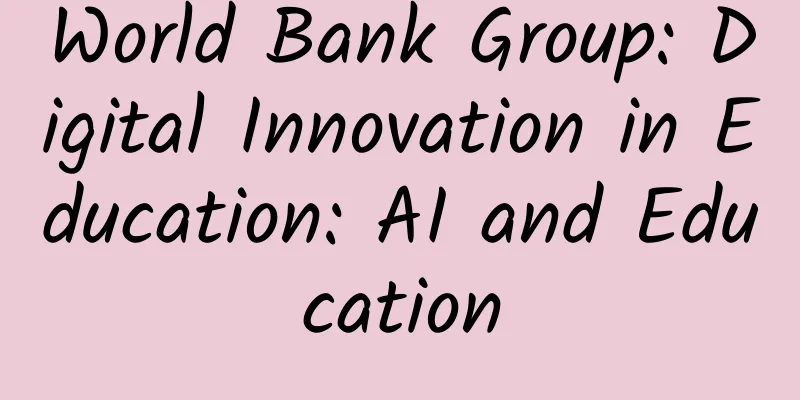World Bank Group: Digital Innovation in Education: AI and Education

|
The rapid development of artificial intelligence (AI) is disrupting the higher education landscape, bringing both opportunities and challenges to higher education. The report analyzes the results of focus group discussions conducted in 10 countries, examining students' views, experiences and concerns about the impact of AI on education. The report consists of three parts. Part I provides a general background on the impact of AI on higher education, the labor market, youth, and AI. Through a comprehensive review of emerging evidence, it explores the key role that higher education institutions (HEIs) should play in developing AI talent, preparing students for an AI-driven workforce, and developing research and policy around the societal impacts of AI. Through tools such as AI-assisted grading, adaptive learning systems, and automated data analysis, AI offers avenues to enhance teaching, learning, management, and decision-making. However, integrating AI also requires revisiting academic programs, strengthening technical infrastructure, addressing ethical risks around privacy and bias, and fostering unique human skills such as critical thinking that AI cannot easily replicate. Achieving AI readiness requires institutional changes such as improving the skills of educators, developing governance frameworks, ensuring equitable access to AI resources, and fostering a culture of innovation to responsibly harness the full potential of AI. The second part of the report discusses key findings about students’ perceptions, uses, and concerns about AI. The study shows that while students frequently use AI tools for academic purposes such as writing, coding, and creative projects, barriers such as high internet costs and low connectivity remain in some areas. In addition, students recognize the potential of AI to enhance learning through personalized feedback and accelerated skill acquisition. However, many learners expressed concerns that over-reliance on technology could stifle critical thinking. Their perceptions of emerging AI career paths varied, but what they had in common was an acknowledgement that current higher education courses are inadequately prepared, suggesting a need for specialized AI training. Part III offers reflections and recommendations for strengthening AI readiness and fluency in higher education. To responsibly harness the transformative potential of AI, governments must support safe, responsible, and human-centered policies, as well as public awareness initiatives, research funding, and the inclusion of AI in educational accreditation frameworks. Higher education institutions should actively reflect on teaching methods, curricula relevant to the changing job market, administrative governance models, and equitable access to technology.
|
>>: For the used car market, how much impact can the entry of the giant Xianyu cause?
Recommend
Git builds a distributed version controller tutorial
Git builds a distributed version controller tutor...
How much does it cost to be an agent of Bozhou Tattoo and Embroidery Mini Program? What is the price of being an agent for Bozhou Tattoo and Embroidery Mini Program?
How much does it cost to be an agent for a tattoo...
Stock Broker Training Camp: Only Know How to Trade Stocks Episode 18
Stock Brother Training Camp: Only Know How to Tra...
The automobile revolution has reached a turning point. Can SAIC's new four modernizations realize the Chinese dream on wheels?
The emergence of smartphones has overturned tradi...
Is parking and charging difficult? SAIC New Energy provides free services at Hongqiao Hub!
Recently, in response to the parking difficulties...
Baiguoyuan private domain gameplay!
Recently, news has been reported again that Bairu...
No idea on how to leverage brand marketing on Teachers’ Day? Come on~
A few days ago, I wrote a copy for Teacher's ...
Be careful! The power sockets in high-speed trains are really harmful to your phone
The annual Spring Festival travel rush has offici...
How to operate Weibo? Sharing of Weibo operation ideas
Recently, many people have asked me how to operat...
The first cold wave of 2024 is about to hit, please check the disease prevention and frost prevention guidelines!
01 Rainfall continues in Jiangnan and other place...
The number of graduate students will exceed 3 million in 2020. How many graduate students are there in China?
As of now, the number of graduate students in my ...
Design of DC power supply system for large enterprise data center (data center solution)
Large-scale enterprise-level data center DC power...
From 30 million to 2.6 million, what benefits can domestically produced MRI machines bring to the people?
Audit expert: Meng Meng Associate Researcher, Ins...
Do you always remember things wrongly? Don’t panic! This means your brain is working properly…
Reviewer of this article: Chen Haixu, Deputy Dire...
How to downgrade Win10 without loss after 30 days of regret
It’s been almost a month since the first batch of...









